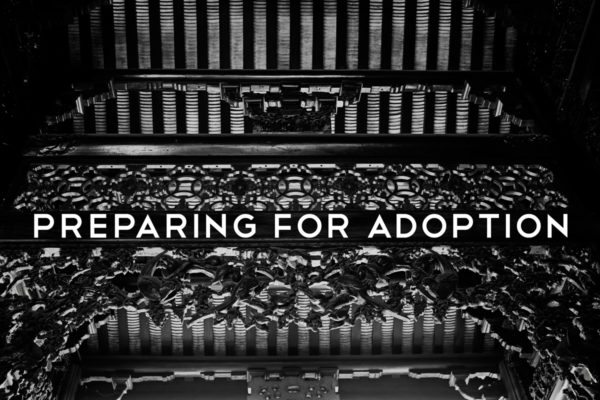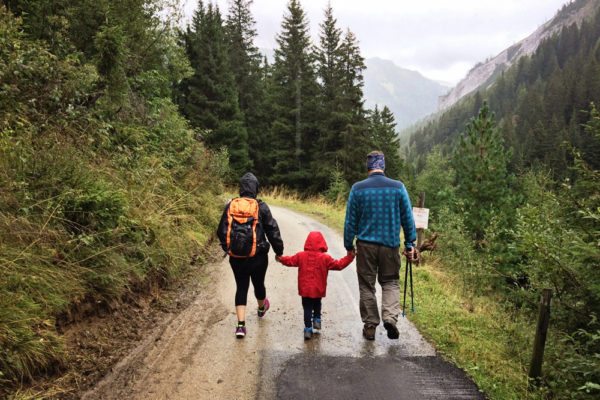You’ve dreamt for this day for months, years even. Planned for it, traveled halfway around the world for it and played it out in your mind a million times. And yet, the reality of becoming a family through adoption is undoubtedly different.
What happens next depends much on how you, as the adoptive parent, process the discrepancy between expectation and reality.
Do you take that initial rejection personally?
Do you panic at un-met milestones?
Does your commitment feel suffocating when the reality of orphanage life is staring you in the face?
Preparing for Adoption is our focus for the next two months. It is our hope to help you be as ready as possible for that day – the day you’ve waiting and longed for – and all the days to follow.

We asked Ashley Yeager, a family therapist and Trust-Based Relational Intervention (TBRI) Practitioner who has been at Lifeline Children’s Services since 2011, to participate in this series. She has witnessed hundreds of families complete the adoption process and today she shares her wisdom based on her education, training and experience.
When writing a post on “preparing for adoption” my mind was pulled a thousand different directions. There are lots of checklists that could be made when you are preparing to bring home a child from China.
I wanted to include the thoughts I consistently hear from post-adoptive families that I believe they would want you to consider if they were given this opportunity as well.
God has allowed me to be a witness to hundreds of adoptive families so that I can encourage you to honestly and realistically prepare for adoption without blinders to the difficulties – but with open hearts and minds to be used by God through this lifelong commitment.

Here are the words that come to mind when preparing for adoption from the perspective of a social worker and family therapist:
1. Prepare yourself.
Know and be comfortable with your own story. Every single one of us has a history filled with great and not-so-great parts. Our history makes each of us who we are; our experiences and relationships with others mold us into the people we are today and affects how we interact with others, especially our children. As a parent you are given the opportunity to enter into your child’s joys and sufferings and be a part of his/her story.
If you have not found healing from past hurts or are unable to coherently form your own story you will not be able to lead your child in doing so. I encourage each person considering adoption to look back on his/her life, recognize the good and the bad, and write your narrative. Take a look at your current relationships and routinely ask yourself what made you respond a certain way to that person during interactions. Think of recent times when someone needed you emotionally and how that made you think, feel and respond.
Develop a mindset of self-awareness. For some, this may bring up old hurts or draw attention to areas that may not be fully resolved. You can further process and self-reflect on your story using journaling, telling someone you trust, or seeking coaching or counseling pre-adoption.
By knowing yourself and your own story you will be more likely to help a child understand his/hers. One of my favorite book resources to help you do this is Parenting from the Inside Out by Dr. Siegel.
2. Prepare your marriage.
If you are married, the foundation of your family is your marriage. I encourage each one of you to protect and strengthen this foundation. I encourage both spouses to commit to being open and honest with one another throughout the adoption process and make sure you are both on the same page to remain a united team. In post-adoption, we sometimes hear one spouse say they felt pressured to adopt or didn’t want to disappoint their spouse so they just agreed to certain aspects of the adoption.
If you are reading this and find yourself in this place, begin praying. Pray that God would change either your or your spouse’s heart, seek counsel together if necessary, and make honesty a priority in your marriage and about the process in particular. If you find yourselves on different pages this may mean that you need to meet with a pastor, coach or counselor to talk through differing opinions and fears, talk with adoption professionals at an agency about what to expect, or meet with other adoptive families. Do not be afraid to ask questions and continually assess as you walk the adoption journey.

Also, to strengthen your marriage I encourage each couple to have check-in times throughout the week as well as date nights at least once a month if possible. These date nights do not have to be elaborate or even away from the house but make this time a priority. Once your child arrives home you will be focusing on building attachment and the emotional, behavioral, and medical needs of your child, which can increase stress, life busyness, and leave little one-on-one time with your spouse. The stronger your foundation, the more likely you are able to cope when the foundation is tested.
For single parents, I encourage the same as above but with your support system, whether that is a best friend, family member, or small group of ladies. You will need others to rely on for support especially once your child comes home so work hard pre-adoption on strengthening and maintaining those relationships using those check-in times or date nights.
3. Prepare your children.
Create an emotionally available environment in your home with your children. When you first share or continually talk through adoption with your children, listen to their thoughts and watch their nonverbal reactions. Give your children time to process the idea and try not to get offended if they are not on board immediately or change their minds halfway through the process.
If one or more of your children are not keen on the idea, wonder with them about their fears of adoption. If they say “I don’t know” or are unable to verbalize their thoughts, gently make guesses at what you think may be a barrier and see if you can start a deeper conversation. They may confirm or deny your guesses so remain open to their thoughts and feelings and encourage they share with you to help ease some of those fears. Each time they do share with you, try not to immediately fix it but rather reflect what you heard them say so they know you understand. This does not mean you agree with their statements but it does show you are listening and want to help.
After you’ve listened well and understand how they are feeling you can speak truth into the situation. You can also create a routine of sharing good and not-so-good thoughts, feelings, and events throughout the day in your home. You can do this by asking each family member to describe a rose (good) and a thorn (bad) for the day either at dinner or bedtime.
By practicing these skills you can show your children that you are available to help them process their thoughts and feelings, so when your adoptive child comes home and they are having harder days they will be more likely to be honest with you.
4. Prepare your community.
Build and strengthen your support system. If you haven’t already, mention the idea of adoption to your closest family, friends, accountability partners, etc. so they can begin praying for you and this process. You will need your support system throughout the adoption process, especially post-adoption, so begin to warm their hearts to the idea of an adopted child joining your family.
You can also begin creating a list of ways in which your family/friends can help you when your child comes home. Pre-identify people in your life that can support you emotionally and listen to you in addition to the more tangible ways people can help.

Many of us have a difficult time asking for help either because of our pride, not wanting to burden others, etc. and these are the people that may struggle the most once their child is home. If you know you struggle to ask for help (or others would identify you in that way) go ahead and discuss this with your close family and friends and ask that they hold you accountable when they see that you may be pushing away support.
5. Prepare through education.
Ask questions. I have heard “I wish I would have known” or “If only someone would have told me” regularly when counseling parents post-adoption. Parenting a child who was adopted calls for extra preparation because adoption starts from a place of loss, and many adoptive children have endured difficult circumstances on top of the loss of biological parents.
Once you begin to educate yourself you may read about scary stories and begin to worry about the “what ifs”, which can cause some to retreat from the education. Such avoidance typically comes from a place of fear masked by other emotions and rationalizations. Lean into that avoidance; really ask yourself what you are afraid of and seek resources to help you overcome or prepare for that fear.
Adoption can be very hard but the more prepared and educated you are, the more your expectations are realistic rather than idealistic. The more you anticipate your families’ needs the better your post-adoption experience may be.
When training families for international adoption we encourage them to think about how much training they have completed (or wish they had) for the job they hold. Then we ask that they think about how much more important the job of raising children and making disciples of our children is – we should seek as much training as we can for this important role.
God has thankfully blessed many adoptive parents, authors, researchers, psychologists, counselors, social workers, etc. with wisdom and knowledge on adoption and He can and will use those avenues to equip you to answer the call to adopt.
Even if you are not a reader or married to a reader, there are videos, podcasts, audible books, and live trainings to help prepare you for parenting an adoptive child.

Here are a few of my favorite resources:
Ready or Not by Pam Parish
The Connected Child by Drs. Purvis & Cross (along with the book’s free study guide for Christians, Created to Connect)
Empoweredtoconnect.org
TCU’s Healing Families DVDs
Healing Parents by Levy & Orlans
The Whole Brain Child by Drs. Siegel & Bryson
The Whole Life Adoption Book by Schooler & Atwood.
I know that is a lot of preparation to be added to the checklist but I hope some of it will come naturally as you go about your days in waiting. Thanks for sticking it out until the end and letting me share with you!
Ashley holds a Bachelor of Science degree in Psychology & Sociology as well as a Master of Social Work degree. She is a Licensed Independent Clinical Social Worker and is certified for Private Independent Practice in Social Casework & Clinical Social Work. Ashley is a TBRI Practitioner and is currently a Family Therapist with Lifeline Children’s Services in Birmingham, Alabama. You can connect with Ashley here.

























Leave a Reply